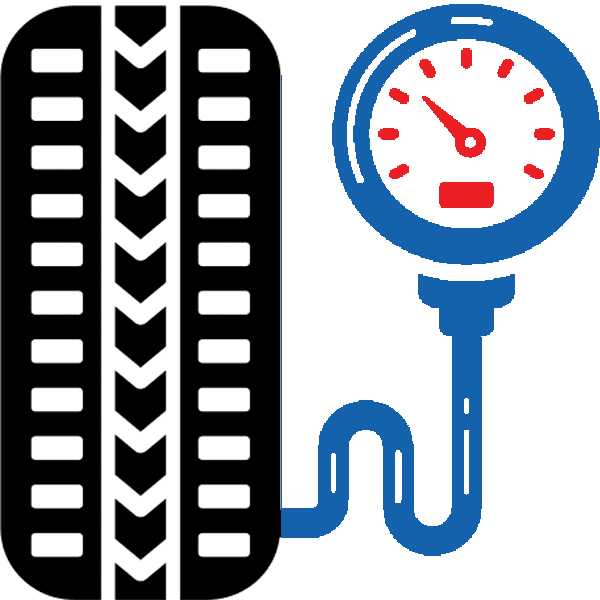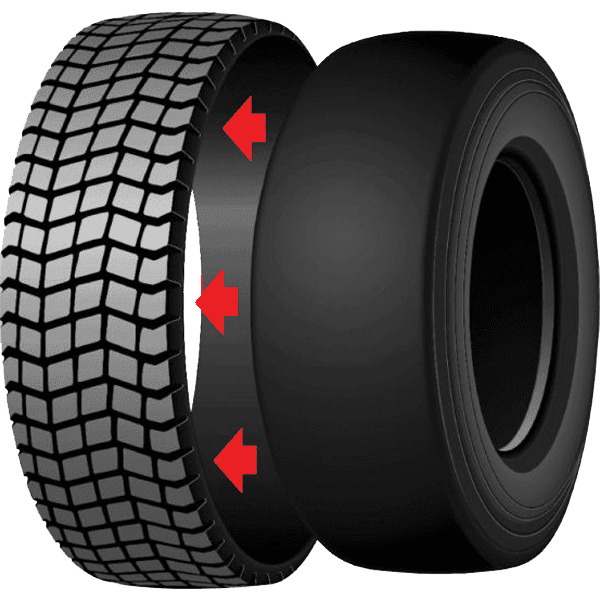COMMERCIAL VEHICLE TYRE SERVICE

Truck Tyre Pressure Correction
Truck Tyres and Air Pressure
No tyre will work correctly if it is used with incorrect air pressure, especially truck tyres. Incorrectly inflated tyres are unsafe and increase costs for the operator.
Commercial vehicles, such as trucks, trailers, buses, and coaches, present a unique challenge due to the variety of work done by the vehicle and the changes in load during a typical operating day. The tyres must promote the safe operation of the vehicle from full to empty, heavy to light, and from low speed to maximum speed, all on starkly different road conditions.
Air is the crucial component of a tyre. It is the air inside the tyre that supports the load of the vehicle. The tyre and wheel assembly combine to keep the air in place during the tyre’s service life. Without the correct air pressure, many negative consequences occur.
Impact on Tyres and the Problems of Heat
Heat is the enemy of any pneumatic rubber tyre, especially those fitted to trucks supporting heavy loads. During normal commercial vehicle operation, a certain level of heat is generated, and the tyre is designed to cope with that operating heat. This is why tyre pressure should be checked when the tyres are at ambient temperature—because heat will increase the pressure in the tyre.
When the tyre is operated with insufficient air pressure, it will deflect beyond its design limits. When the truck and trailer are at maximum weight, the vehicle loads will increase deflection even further.
This results in a larger than desirable tyre footprint, causing more drag, extra strain on the sidewall and shoulder, and increased tyre heat. The extra drag increases fuel consumption and emissions.
Excessive heat damages the internal components of the tyre, causing them to degrade and break down, potentially leading to rapid and uncontrolled deflation. Internal tyre damage cannot be seen by the naked eye but can be identified during a shearographic analysis. Incorrect tyre pressure prevents a tyre from reaching its maximum multi-life stage, reducing the available tread mileage and the opportunity for the casing to continue in service.
Monitoring and Maintaining Correct Tyre Pressure
Every tyre will naturally lose air; a pressure loss of about 3% per month should be expected. Vehicles operating with under-inflated tyres are needlessly inefficient. They experience increased fuel consumption and accelerated tyre wear, with compromised handling, braking, and stability.
Monitoring tyre pressures also provides an early warning for slow punctures before the issue becomes apparent during daily visual inspections or noticeable in the vehicle’s handling. Left unidentified, this could escalate in severity, causing a roadside tyre breakdown and potentially premature replacement.
Impact on the Operation of the Vehicle
Running tyres at the wrong pressure:
- Increases the risk of aquaplaning
- Increases braking distance
- Impairs cornering and vehicle handling characteristics
- Increases the risk of tyre rupture
While under-inflation tends to get the most attention, over-inflation is also problematic:
- A smaller footprint reduces grip and increases stopping distance
- Reduced resistance to impact and penetration
- Irregular tread wear, pronounced on the crown rather than evenly across the tread
This is why Tyres24 emphasizes the correct operating pressure. Both under-inflation and over-inflation matter equally.
Final Thoughts on Truck Tyre Inflation
Ask even a non-driver to list important vehicle maintenance tasks, and they are sure to include tyre pressure maintenance. For trucks, trailers, coaches, and buses, the loads and distances traveled make it even more critical.
Tyre inflation management is an essential part of a tyre maintenance system. Whether performed by TPMS or a physical check with a calibrated tool, it is one of the tasks that will easily increase tyre life and reduce fuel consumption.
- Frequent pressure checks promote the maximum longevity of the tyre, both for its current on-axle life and any future life (e.g., when the truck tyre is regrooved or retreaded).
- A truck, bus, trailer, or coach tyre operated at the correct pressure is in a safe state. When improperly inflated, the tyre operates unsafely.
- Trucks operating with insufficient pressure experience worse fuel economy and higher emissions.
Contact Tyres24 today to ensure your fleet’s tyres are correctly inflated and maintained for optimal performance and safety.
Multi-brand tyres
Commercial Tyre Replacement
Tyre Maintenance
Comprehensive tyre maintenance
Roadside Support
Emergency roadside assistance, anywhere
Safety First
Prioritizing safety with exceptional service
Contact us
Mobile tyre services for your commercial vehicle fleet
Telephone 0800 208 8033
Monday to Friday 9am-5pm
Saturday 8am-12pm
Rapid roadside support 24/7/365
We’re open 24/7/365 for all existing
customers with a credit account






